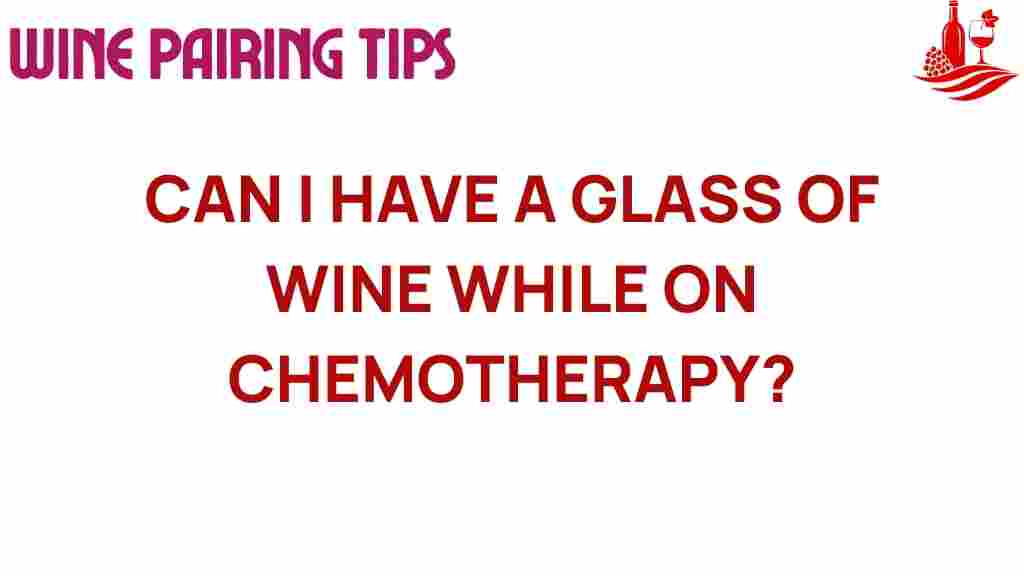Can Wine and Chemotherapy Coexist? A Closer Look at the Risks
When it comes to cancer treatment, chemotherapy is one of the most common methods used to combat the disease. However, many patients undergoing this treatment may wonder about the impact of lifestyle choices, particularly alcohol consumption, on their health and treatment outcomes. One question that arises frequently is whether wine and chemotherapy can coexist. In this article, we will explore the risks associated with wine consumption during chemotherapy, provide patient advice based on medical guidelines, and discuss how to maintain wellness during cancer treatment.
Understanding Chemotherapy and Its Effects
Chemotherapy involves the use of powerful drugs designed to kill cancer cells or inhibit their growth. While effective, chemotherapy can also have significant side effects on the body, including:
- Nausea and vomiting
- Fatigue
- Weakened immune system
- Hair loss
- Changes in appetite
These side effects can vary depending on the type of cancer, the specific drugs used, and the individual’s overall health. Understanding how these factors interact with alcohol consumption, specifically wine, is crucial for patients navigating their treatment.
The Health Risks of Alcohol Consumption During Chemotherapy
Alcohol, including wine, can pose several health risks for patients undergoing chemotherapy. Some of the key concerns include:
1. Interaction with Chemotherapy Drugs
Many chemotherapy drugs can interact negatively with alcohol, potentially leading to increased toxicity or reduced effectiveness of the treatment. For example:
- Alcohol can exacerbate side effects of certain medications.
- Some chemotherapy drugs may require the liver to process them, and alcohol can strain liver function.
2. Weakened Immune System
One of the significant side effects of chemotherapy is a weakened immune system. Alcohol consumption can further compromise immune function, making patients more susceptible to infections. This is particularly concerning during treatment when patients are already at risk.
3. Nutritional Deficiencies
Alcohol can lead to poor nutrition, which is critical for recovery during cancer treatment. Wine, while often seen as a healthier alcohol choice, still contributes to caloric intake without providing essential nutrients. This can hinder the body’s ability to heal and recover.
Patient Advice: What Medical Guidelines Recommend
Given the potential risks associated with alcohol consumption during chemotherapy, medical guidelines often advise caution. Here are some general recommendations:
1. Consult Your Healthcare Team
Before making any decisions about alcohol consumption during chemotherapy, it’s essential to discuss this with your oncologist or healthcare provider. They can provide personalized advice based on your treatment plan and health status.
2. Understand Your Treatment Regimen
Different chemotherapy regimens may have varying levels of risk regarding alcohol interaction. Make sure to ask your healthcare provider about the specific drugs you are taking and any known interactions with wine or other alcoholic beverages.
3. Moderation is Key
If your doctor approves moderate wine consumption, be mindful of the quantity. The definition of moderation can vary, but generally, it means:
- One glass per day for women
- Two glasses per day for men
Maintaining Wellness and Lifestyle Choices During Treatment
While navigating chemotherapy, it is crucial to focus on overall wellness. Here are some lifestyle choices that can support health during treatment:
1. Focus on Nutrition
Eating a balanced diet rich in fruits, vegetables, whole grains, and lean proteins can provide the nutrients your body needs to fight cancer and recover from treatment. Consider the following tips:
- Incorporate a variety of colorful fruits and vegetables.
- Choose whole grains over refined grains.
- Stay hydrated with water and other non-alcoholic beverages.
2. Engage in Physical Activity
Regular physical activity can help combat fatigue, improve mood, and enhance overall wellness. Aim for at least 150 minutes of moderate exercise per week, as tolerated. Activities may include:
- Walking
- Yoga
- Swimming
3. Prioritize Mental Health
Coping with cancer treatment can be emotionally challenging. Consider incorporating mindfulness practices, such as meditation or deep breathing exercises, to support mental health. Joining a support group may also provide comfort and connection with others experiencing similar challenges.
Troubleshooting Tips for Patients Considering Wine
If you are a patient considering wine consumption during chemotherapy, here are some troubleshooting tips to consider:
1. Track Your Symptoms
Keep a diary of your symptoms and any changes you notice after consuming wine. This information can be invaluable in discussing your health with your oncologist.
2. Be Aware of Your Body
Listen to your body. If you notice increased fatigue, nausea, or any other concerning side effects after drinking wine, it may be best to avoid it altogether.
3. Seek Support from Healthcare Providers
Don’t hesitate to reach out to your healthcare team with questions or concerns about alcohol consumption. They are there to help you navigate these choices safely.
Conclusion: Making Informed Choices
In conclusion, while the question of whether wine and chemotherapy can coexist is complex, it is essential for patients to prioritize their health and safety during cancer treatment. The potential health risks associated with alcohol consumption during chemotherapy warrant careful consideration and consultation with healthcare providers. By understanding medical guidelines and focusing on wellness through nutrition, exercise, and mental health, patients can make informed choices that support their overall health during treatment.
If you’re looking for more information on cancer treatment and wellness, consider visiting this resource page that provides detailed guidelines and support for cancer patients. Always remember that your health journey is unique, and the best decisions come from informed discussions with your medical team.
Ultimately, the choice to consume wine during chemotherapy should be made with caution and respect for the potential risks involved. Prioritizing your health and well-being is essential in navigating your cancer treatment successfully.
This article is in the category Tips and created by Wine Pairing Tips Team
